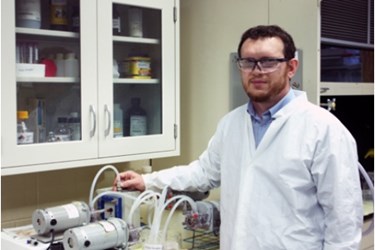Chemical Engineering Department Partners With Start-Up To Research Water Treatment

The Ralph E. Martin Department of Chemical Engineering at the University of Arkansas has been partnering with Flexible Water Solutions, a local start-up business focused on oilfield water treatment, for the past two years.
"As a small start-up business, we were unable to staff an entire research and development team, much less acquire the equipment needed to conduct the necessary lab tests," said John Schmelzle, managing member of Flexible Water Solutions. "Our partnership with the chemical engineering department at the University of Arkansas has really allowed us to save time and money in completing research and development of our product before going to market."
Jamie Hestekin, chemical engineering professor, focuses his research on the treatment of water used in hydraulic fracturing. "One big problem of hydraulic fracturing is that the water used in the process comes up contaminated with minerals such as calcium and sodium," said Hestekin. "The current standard practice is to take the water and inject it into a deep well in the earth. However, we're researching ways to treat this water and recycle it for future use in fracturing or for discharge."
Flexible Water Solutions has funded two graduate students and a post-doctoral associate working with Hestekin. They are testing two membrane techniques – electro-dialysis and nano-filtration – to evaluate their success in treating the water. This summer, FWS will commercialize their first large scale fracturing water treatment system based on technology developed by Hestekin's team. The system will be housed in a semi-trailer that can be transported to oilfields around the country, particularly those that are prone to drought, and be used to clean up water to be reused as well as discharged.
Dmytro Demydov, Hestekin's research associate, has enjoyed researching water treatment and working with FWS. "They have a strong connection with oil companies, and I've had a very good experience with them," said Demydov. "I went on a field test with them to a refinery, where the water conditions are similar to those in fracturing. This research is important because water is a limited resource. Also, saving on water cost can be very helpful for domestic oil companies, especially when oil prices are low."
Hestekin has also had a positive experience with the company. "Flexible Water Solutions has been a great partner," he said. "They're not only concerned with getting out a good product, but they care about the science behind it, too."
"This partnership is a great small business tool," said Schmelzle. "I've been given the resources of an entire university, where we can conduct lab tests, collect and report data, and use the expertise of others in the department when we run into roadblocks. I'm not sure you can get all that anywhere else at such a cost effective level. The partnership with the University of Arkansas also lends credibility to our company. We can explain to multi-national energy companies that our process is a result of a university partnership, and they know that we're not just garage engineers trying to sell something."
The partnership even goes beyond Hestekin's research team. "Jamie has been good at identifying synergies between our project and other research projects in the department," said Schmelzle. "Part of our process was influenced by the research results of another project. Recycling oilfield water is a budding industry still in its infancy, and I am proud that an Arkansas based company and the University of Arkansas are innovating cost effective solutions which will have a substantial impact on our environment."
Source: University of Arkansas
